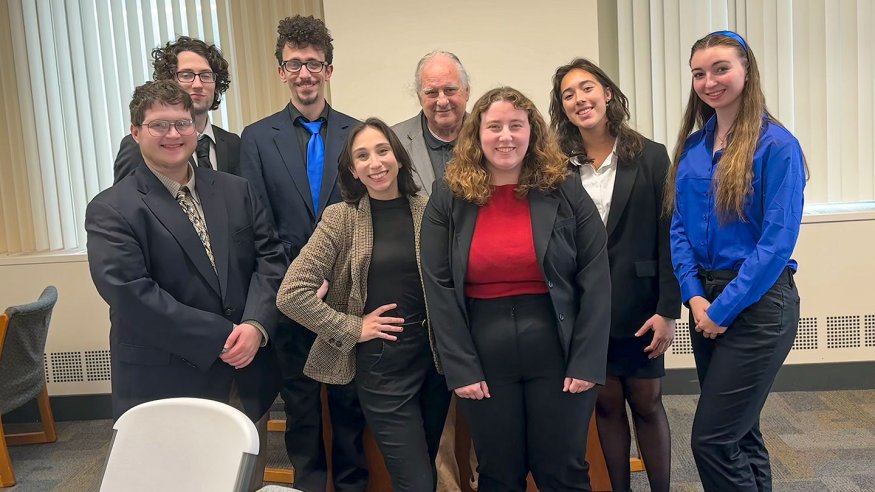
Bishop Barristers
Ohio Wesleyan Students Compete in 2023-2024 Moot Court Competition
Seven Ohio Wesleyan University students competed in the American Collegiate Moot Court Association's 2023-2024 season, with Anna Nacci '24 ranking among the top orators in the Capital City Classic tournament and all of the OWU teams finishing in the top half of event participants.
"The teams were well-prepared as indicated by their scores for 'knowledge of the subject matter' and for the 'organization, logic, and clarity' of their arguments," said Michael Esler, Ph.D., moot court adviser and Ohio Wesleyan professor of Politics & Government.
"The OWU teams put in long hours and work hard, so they are usually prepared and earn high scores in these categories," Esler said. "However, this year's teams also stood out for their scores for the 'forensic skill and courtroom demeanor' category, which is testimony to their ability to perform under pressure."
At the classic, held at Capital University Law School in Columbus, Ohio, the Ohio Wesleyan teams were Nacci of Wooster, Ohio, and Olivia Danley '26 of Ashburn, Virginia; Mason Stickel '25 of South Lyon, Michigan, and Joel Zachary '25 of Los Angeles, California; Leyna Kirsh '26 of Langhorne, Pennsylvania, and Mary James '25 of Potomac, Maryland; and a hybrid team of OWU's Vincent Sack '27 of North Olmsted, Ohio, and Jason Hoang of Saginaw Valley State University. The teams competed against students from colleges and universities across the United States.
The team of Sack and Hoang advanced to the tournament's round of 16, Esler said, while the team of Stickel and Zachary just missed reaching the Sweet 16. Stickel and Zachary tied for the final spot, and two tiebreakers were required to determine which team would advance.
OWU's other teams also performed well, Esler said, with each winning multiple ballots. "The rounds were highly competitive with outcomes determined by narrow margins," he said.
Ohio Wesleyan students also earned individual awards during the fall competition, with Nacci being named the ninth-best individual orator. "She was the team's veteran and has performed at a high level throughout her career," Esler said. "Thus, it was no surprise that she finished in the top 10 for individual performance."
Bishops Kirsh, Zachary, and Daley also were recognized for finishing among the top 30 individual orators.
"A majority of OWU's advocates competed for the first time," Esler said. "Most noteworthy was Sack, who was one of only three first-year students ever to compete on the OWU moot court team. He came in with little background in legal studies, as is the case for most first years, but caught on quickly and delivered strong presentations in the tournament."
Overall, 15 teams from small colleges (10,000 or fewer students) competed in the Capital City Classic. Ohio Wesleyan teams finished second, fourth, fifth, and seventh among these schools, Esler said, "continuing a tradition of fielding highly competitive teams at the national level."
Each year, Ohio Wesleyan participates in tournaments sponsored by the American Collegiate Moot Court Association. The tournaments simulate an appellate court hearing in which students present legal arguments and respond to questions from judges. More than 500 teams from universities and colleges nationwide compete in tournaments from October through January. This year's case involved a state law that banned most types of birth control. The law was challenged on the grounds that it violated the right to privacy and the free exercise of religion.
The OWU teams begin preparing over the summer, Esler said. During the summer and fall, they review caselaw, construct arguments for both sides of the issues, practice delivering their presentations, and work on responding to questions.
Participation in moot court is excellent preparation for students interested in pursuing a career in law, Esler said, noting that law schools look favorably upon the skills that applicants develop through moot court. However, he said, moot court also attracts students who seek to examine and debate contemporary issues from a variety of perspectives, but do not plan to attend law school.
Students interested in joining Ohio Wesleyan's moot court team should contact Esler at mvesler@owu.edu.
